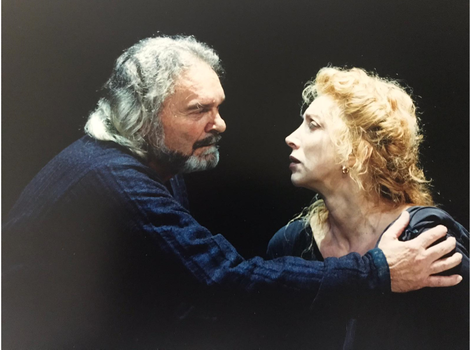Phaedra (Racine)
Phaedra is a tragedy by the French playwright Jean Racine that was published in 1677.

Sources
The play is based on the tragedy of Euripides, which narrates the myth of Phaedra. However, Racine also took into account the contributions to the myth of tragedy by Seneca and Garnier.
Argument

- Act I. Hippolyte, son of Teseus and a amazon, announces to his confidant that he intends to leave the city of Trecena to flee from his love for Aricia, heir of an enemy clan of Teseus. Fedra, Teseo's second wife, confesses to Enone, his confidant and mother-in-law, the passion he experiences for his Hippolyte stepdaughter. This love shames her to the point where she has decided to kill herself. But news arrives that Teseo has died in a distant campaign.
- Act II. Aricia confides to her maid who is in love with Hippolytus; he comes and manifests his feelings. Fedra comes to see Hippolytus and, by Enone's pressure, speaks to him and even comes to the confession of his love. Hippolyte, horrified, rejects her, so Fedra returns to her suicidal desires.
- Act III. Recent news reports that Teseo has appeared alive in Epiro and will soon return. He arrives at Trecena and is surprised by the coldness with which he is received: Hippolyte refutes his stepmother, Fedra is disobeyed by guilt.
- Act IV. Enone, who fears that his owner will commit suicide, tells Teseo that Hipólito has tried to seduce Fedra. Teseo distills Hippolytus and asks the god Neptune to kill him. When Fedra, repentant, is willing to ask for mercy for his stepfather and perhaps to confess his fault, Teseo himself tells him that Hippolytus has claimed in his defense his love for Aricia, which makes Fedra, jealous, street and thus condemn Hippolytus.
- Act V. Hippolytus left after he promised Aricia he would marry her outside the city. Teseo has doubts about her son's guilt and decides to ask Aricia the truth but she doesn't know it because she respects Hippolytus' decision to shut up for respect for her father, just tells her he's wrong. Teseo decides to go talk to Enone, but Pánope tells him that he committed suicide. Then Teseo realizes he was wrong, but the news of Hippolyte's death comes: he has crashed into the rocks fleeing from a sea monster. Fedra confesses everything to Teseo; Enone dies drowned; Fedra has swallowed poison and collapses on stage. Teseo, to avenge his son, decides to adopt Aricia...
Characters
Racine's characters are not abstract forces, but human, and very emotional.

representation of the work in 2000
Phaedra
This character dominates the entire work. She first appears lovesick, unable to resist concupiscence and remorse. Racine tries to ensure that her character awakens compassion and respect in the viewer; she is a character torn by shame. She despises herself. Jealous of Aricia, the very idea of the happy couple is what horrifies her. She can't stand the idea of that happiness as a couple.
Oenone
Racine makes this character adopt the role of confidant, as well as instigator.
Hippolytus
He is a pure being, unjustly punished for rejecting his stepmother's incestuous love. He behaves heroically by not revealing Phaedra's shameful confession, out of love and filial respect.
Theseus
He appears as an institutional character, not so much as a lover but as a husband and father.
Aricia
The only objective of this character is to arouse Phaedra's jealousy. You can do nothing to change the previous events.
Contenido relacionado
Troy Horse
Shakespeare in love
Gertrudis Gomez de Avellaneda
Costa Rican Literature
Romulo Gallegos